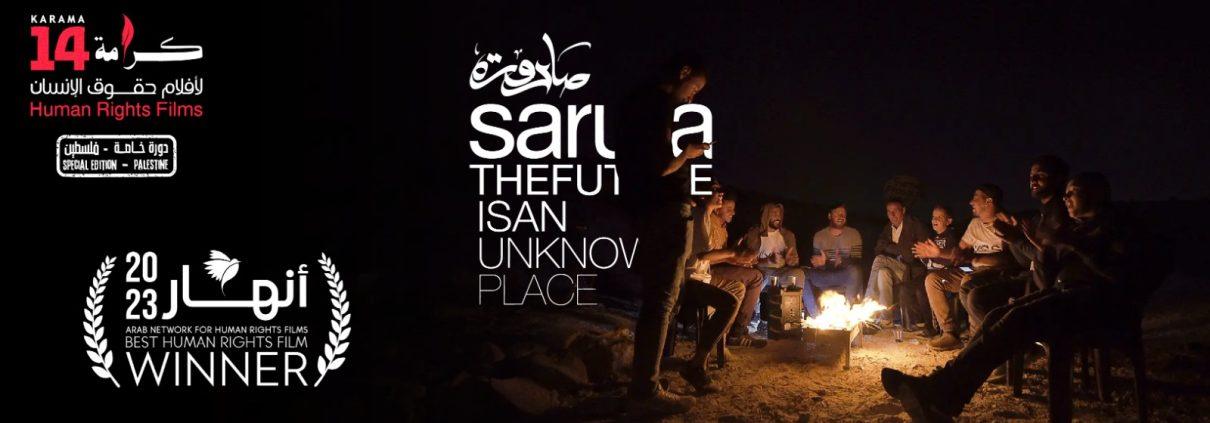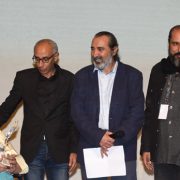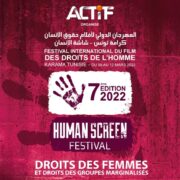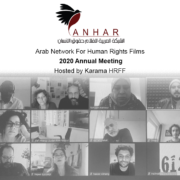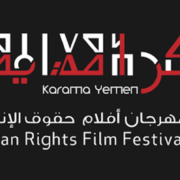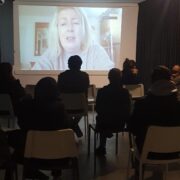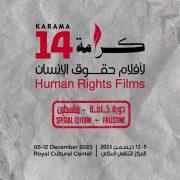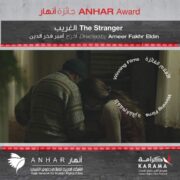Announcing the 8th ANHAR Award
The 8th ANHAR Award was presented at the closing of the 14th edition of Karama Film Festival in Jordan. The film is awarded for the best human rights film that promotes cinematic culture, with an aim of enhancing the concepts of human rights in the Arab region.
The nominees were selected by ANHAR’s members who have screened these films in their festivals and programs. The winning film was voted by all members of the Arab Network ANHAR.
Six films were nominated for the award:
– “Anxious in Beirut”, directed by Zakaria Jaber
93 minutes | Lebanon, Qatar, Spain, Jordan | 2023
– “My Lost Country” directed by Ishtar Yasin Gutiérrez
94 minutes | Iraq, Egypt, Chile | 2022
– “Notes on Displacement” by Khaled Jarrar
74 minutes | Germany, Qatar, Palestine | 2022
– “SUPER SALIHA” directed by Imad Al-Mathnani
60 minutes | Qatar, Tunisia | 2023
– “Sarura: The Future Is An Unknown Place” directed by Nicola Zambelli
80 minutes | Italy, Palestine | 2023
Award Comittee Statement
The award was given to the film “Sarura” by Nicola Zambelli, who raises through his film about the boys and girls of “Youth of Sumud” are trying to bring back life in the village of Sarura, planting olive trees, escorting the shepherds of the area with their cameras and helping other villages threatened with eviction orders by the Israeli government with their presence. A fragile but powerful struggle, capable of undermining the expansion plans of the government of Israel that would like to remove all the shepherds of the area.
The committee of ANHAR- Arab Network for Human Rights Films & Festivals has met to award the best documentary film on the Palestinian Question.
The committee found it difficult this year to choose the best film due to the excellence of all films that discuss the Palestinian issue. Finally, and after dwelling on the film elements, the committee took its decision to award the documentary “Sarura” to the Italian Director Nicola Zambelli for the following reasons:
1 The committee considered the time duration for completing the film, which was completed over 10 years. We followed the film’s characters at different stages of their ages and life. For us, this great effort requires many years of endurance from the director and crew to achieve.
2 The committee viewed the importance of the subject since the film addressed the issue of the southern villages of Hebron that is constantly exposed to ethnic cleansing and continuous property demolition by the Israeli occupation forces, noting that these villages live in complete isolation and the people resist with their bare hands.
3 The committee found that the film depicted distinctive footage, especially of the clashes between the Palestinian residents of the village and the military occupation forces, and thus important documentation of the settlers’ attacks on the defenseless residents of the village.
4 – Despite the harsh reality, the committee found that the film is composed of aesthetic shots and scenes, showing the aesthetics of the villages in Masafer Yatta, and the committee noted the meticulous work on the image and the natural sound.
5- The committee found that granting the award to “Sarura” by director Nicola Zambelli could be considered as a valid historical document and evidence that can enhance the case of the Palestinian people, and would help to shed light on the tragedy of the villagers and thus convey to the world their daily struggle to attain justice.
Film Synopsis
At the gates of the Negev desert, a group of young Palestinians fight against the Israeli military occupation. “Youth of Sumud” – the youth of steadfast perseverance – try to return to their people the land that was taken from their families, restructuring the ancient cave village of Sarura.
They face aggression with nonviolent action, defending themselves from rifles with their video cameras; they oppose desolation and death with hope and life.
Ten years after their first documentary on the nonviolent struggle in the West Bank, the directors return to the village of At-Tuwani and, using archival material more than 15 years old, tell how the children have grown up. Today the caves of Sarura have been restored by a group of young Palestinians, gathered in a collective called “Youth of Sumud” (resistance): they are the sons and daughters of nonviolent militants of the popular resistance committee of the adjacent village of At- Tuwani, who for more than 20 years have managed to resist evacuation attempts of their land thanks to nonviolent actions and the solidarity of Israeli and international peace activists.
The boys and girls of YOS are trying to bring back life in the village of Sarura, planting olive trees, escorting the shepherds of the area with their cameras and helping other villages threatened with eviction orders by the Israeli government with their presence. A fragile but powerful struggle, capable of undermining the expansion plans of the government of Israel that would like to remove all the shepherds of the area.
With “Tomorrow’s Land” (2010) we talked about At-Tuwani’s experience of resistance, today with “Sarura” we want to imagine the future that will come together with the new generation.
About the director
Nicola Zambelli (1981) is an Italian documentary, reportage, and artistic video filmmaker. Graduated in Hermeneutic Philosophy with a thesis on the narrative identity of the Self in a comparison between philosophy, photography, and documentary cinema, he obtained a Master’s in documentary at the IED in Milan. He is involved in directing, photography and camera.
He is one of the founders of SMK Factory, an independent production company with whom he has made several documentaries awarded at international festivals and screened all over the world. SMK is the creator of the independent distribution portal Open DDB, a multilingual digital platform inspired by the open-source philosophy that promotes documentary cinema and independent culture through VOD and non-theatrical circuitry, collaborating with cultural associations and independent cinemas.
He works on educational projects in the schools with which he won the first prize in 2019 and a special mention at the “International Audiovisual Awards” on the days of the 76th Venice International Film Festival.
first lock-down with which he wins the prize “Resilient Communities” and the audience prize at the “Visioni urbane di Bologna” festival.
His latest documentary film “Sarura – the future is an unknown place” was selected in 2020 at the “Impact Days” of the Human Rights Festival FIFDH in Geneva and at the “Industry Days” of the Milan Festival “Visions from the World”.

